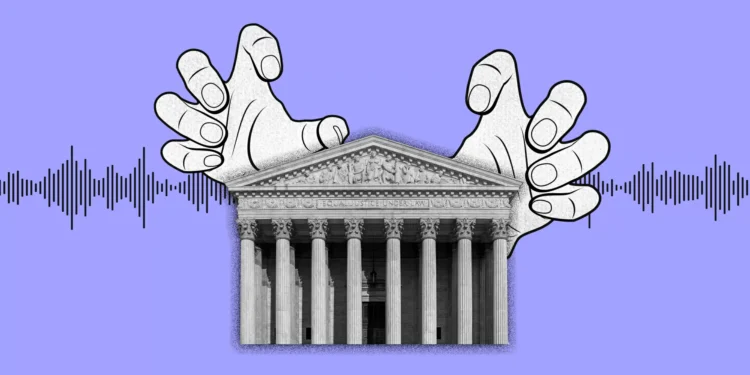In recent years, the Supreme Court of the United States has been at the forefront of many controversial decisions. From issues surrounding immigration and birthright citizenship to reproductive rights and executive power, the Supreme Court has been the subject of intense scrutiny. However, one legal scholar in particular has been closely examining the Court’s role in enabling presidential overreach – Leah Litman.
Litman, an Assistant Professor of Law at the University of Michigan and co-founder of Take Care, a legal blog focusing on executive power and the law, has been vocal about the Supreme Court’s role in dismantling the legal limits on executive power. In a recent interview with The Intercept, Litman discusses how the Court has been complicit in allowing the executive branch to overstep its boundaries and the consequences this has on our democracy.
The issue of executive power has been a contentious one since the birth of our nation. As the Founding Fathers crafted the Constitution, they carefully divided powers between the three branches of government – legislative, executive, and judicial – in order to prevent any one branch from becoming too powerful. However, as Litman points out, recent decisions by the Supreme Court have eroded these checks and balances and opened the door for executive lawlessness.
One of the key examples Litman cites is the Court’s ruling in Trump v. Hawaii, which upheld the Trump administration’s controversial travel ban. This decision, according to Litman, not only gave the president wide-ranging powers to restrict entry into the country, but also set a dangerous precedent for future executive actions. Litman argues that the Court’s deference to the executive in this case has essentially given permission for presidential overreach.
Litman also highlights the Court’s recent decision on LGBTQ+ employment rights, where the majority opinion was written by Associate Justice Neil Gorsuch, a conservative appointee. In this case, the Court ruled in favor of protecting LGBTQ+ workers from discrimination, a decision that was surprising to many. However, as Litman notes, the Court’s decision was based on textualist reasoning, rather than a more progressive interpretation of the law. This means that future courts, with more conservative justices, could easily reverse this decision and undermine LGBTQ+ rights once again.
Furthermore, Litman argues that the Court’s decision in Department of Homeland Security v. Regents of the University of California, which upheld the Trump administration’s attempt to end the Deferred Action for Childhood Arrivals (DACA) program, has far-reaching repercussions. Not only does this decision go against previous legal rulings, but it also sets a dangerous precedent for the future of executive power. Litman warns that this decision essentially gives the president the power to revoke any executive action put in place by a previous administration, regardless of its impact on individuals or our democracy.
Litman’s analysis of the Supreme Court’s role in enabling presidential overreach is an important reminder of the importance of checks and balances in our government. As she points out, executive power has been expanding for decades, and the Court’s willingness to defer to the executive only exacerbates this issue.
This is not to say that the Supreme Court is solely responsible for the erosion of checks and balances. As Litman notes, other factors such as partisan politics and the increasing polarization of the Court also play a significant role. However, the Court, as the ultimate arbiter of the law, has a crucial responsibility to uphold the Constitution and protect our democracy from executive lawlessness.
In the current political climate, where the boundaries of executive power are constantly being tested, it is more important than ever to have voices like Litman’s in the legal landscape. Her work serves as a reminder to the Court and to the American people that our democracy depends on the preservation of checks and balances and the rule of law.
In conclusion, the Supreme Court’s decisions in recent years have shown a troubling trend towards enabling presidential overreach. As Litman eloquently states, “the law is only as strong as the courts’ willingness to enforce it.” As a society, we must hold our institutions accountable to protect our Constitution and the principles it upholds. Leah Litman’s work serves as a call to action to continue fighting for a stronger, more balanced system of governance that truly represents the values of the American people.






